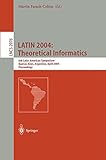LATIN 2004: Theoretical Informatics [electronic resource] : 6th Latin American Symposium, Buenos Aires, Argentina, April 5-8, 2004, Proceedings /
Material type: TextSeries: Lecture Notes in Computer Science ; 2976Publisher: Berlin, Heidelberg : Springer Berlin Heidelberg : Imprint: Springer, 2004Edition: 1st ed. 2004Description: XVI, 632 p. online resourceContent type:
TextSeries: Lecture Notes in Computer Science ; 2976Publisher: Berlin, Heidelberg : Springer Berlin Heidelberg : Imprint: Springer, 2004Edition: 1st ed. 2004Description: XVI, 632 p. online resourceContent type: - text
- computer
- online resource
- 9783540246985
- 004.0151 23
- QA75.5-76.95
Invited Speakers -- Analysis of Scheduling Algorithms for Proportionate Fairness -- Advances in the Regularity Method -- Fighting Spam: The Science -- The Consequences of Imre Simon’s Work in the Theory of Automata, Languages, and Semigroups -- Contributions -- Querying Priced Information in Databases: The Conjunctive Case -- Sublinear Methods for Detecting Periodic Trends in Data Streams -- An Improved Data Stream Summary: The Count-Min Sketch and Its Applications -- Rotation and Lighting Invariant Template Matching -- Computation of the Bisection Width for Random d-Regular Graphs -- Constrained Integer Partitions -- Embracing the Giant Component -- Sampling Grid Colorings with Fewer Colors -- The Complexity of Finding Top-Toda-Equivalence-Class Members -- List Partitions of Chordal Graphs -- Bidimensional Parameters and Local Treewidth -- Vertex Disjoint Paths on Clique-Width Bounded Graphs -- On Partitioning Interval and Circular-Arc Graphs into Proper Interval Subgraphs with Applications -- Collective Tree Exploration -- Off-Centers: A New Type of Steiner Points for Computing Size-Optimal Quality-Guaranteed Delaunay Triangulations -- Space-Efficient Algorithms for Computing the Convex Hull of a Simple Polygonal Line in Linear Time -- A Geometric Approach to the Bisection Method -- Improved Linear Expected-Time Algorithms for Computing Maxima -- A Constant Approximation Algorithm for Sorting Buffers -- Approximation Schemes for a Class of Subset Selection Problems -- Finding k-Connected Subgraphs with Minimum Average Weight -- On the (Im)possibility of Non-interactive Correlation Distillation -- Pure Future Local Temporal Logics Are Expressively Complete for Mazurkiewicz Traces -- How Expressions Can Code for Automata -- Automata for Arithmetic Meyer Sets -- Efficiently Computing the Density ofRegular Languages -- Longest Repeats with a Block of Don’t Cares -- Join Irreducible Pseudovarieties, Group Mapping, and Kovács-Newman Semigroups -- Complementation of Rational Sets on Scattered Linear Orderings of Finite Rank -- Expected Length of the Longest Common Subsequence for Large Alphabets -- Universal Types and Simulation of Individual Sequences -- Separating Codes: Constructions and Bounds -- Encoding Homotopy of Paths in the Plane -- A Unified Approach to Coding Labeled Trees -- Cost-Optimal Trees for Ray Shooting -- Packing Problems with Orthogonal Rotations -- Combinatorial Problems on Strings with Applications to Protein Folding -- Measurement Errors Make the Partial Digest Problem NP-Hard -- Designing Small Keyboards Is Hard -- Metric Structures in L 1: Dimension, Snowflakes, and Average Distortion -- Nash Equilibria via Polynomial Equations -- Minimum Latency Tours and the k-Traveling Repairmen Problem -- Server Scheduling in the Weighted ? p Norm -- An Improved Communication-Randomness Tradeoff -- Distributed Games and Distributed Control for Asynchronous Systems -- A Simplified and Dynamic Unified Structure -- Another View of the Gaussian Algorithm -- Generating Maximal Independent Sets for Hypergraphs with Bounded Edge-Intersections -- Rooted Maximum Agreement Supertrees -- Complexity of Cycle Length Modularity Problems in Graphs -- Procedural Semantics for Fuzzy Disjunctive Programs on Residuated Lattices -- A Proof System and a Decision Procedure for Equality Logic -- Approximating the Expressive Power of Logics in Finite Models -- Arithmetic Circuits for Discrete Logarithms -- On the Competitiveness of AIMD-TCP within a General Network -- Gathering Non-oblivious Mobile Robots -- Bisecting and Gossiping in Circulant Graphs -- Multiple Mobile Agent Rendezvous in a Ring.-Global Synchronization in Sensornets.
This volume contains the proceedings of the Latin American Theoretical Inf- matics (LATIN) conference that was held in Buenos Aires, Argentina, April 5–8, 2004. The LATIN series of symposia was launched in 1992 to foster interactions between the Latin American community and computer scientists around the world. This was the sixth event in the series, following S˜ ao Paulo, Brazil (1992), Valparaiso, Chile (1995), Campinas, Brazil (1998), Punta del Este, Uruguay (2000), and Cancun, Mexico (2002). The proceedings of these conferences were also published by Springer-Verlag in the Lecture Notes in Computer Science series: Volumes 583, 911, 1380, 1776, and 2286, respectively. Also, as before, we published a selection of the papers in a special issue of a prestigious journal. We received 178 submissions. Each paper was assigned to four program c- mittee members, and 59 papers were selected. This was 80% more than the previous record for the number of submissions. We feel lucky to have been able to build on the solid foundation provided by the increasingly successful previous LATINs. And we are very grateful for the tireless work of Pablo Mart´ ?nez L´ opez, the Local Arrangements Chair. Finally, we thank Springer-Verlag for publishing these proceedings in its LNCS series.


There are no comments on this title.